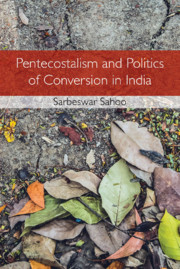Book contents
- Frontmatter
- Contents
- Foreword
- Preface
- Abbreviations
- 1 Introduction: Conversion and the Shifting Discourse of Violence
- 2 Spreading Like Fire: The Growth of Pentecostalism among Tribals
- 3 Taking Refuge in Christ: Four Narratives on Religious Conversion
- 4 Becoming Believers: Adivasi Women and the Pentecostal Church
- 5 Seen as the Alien: Hindutva Politics and Anti-Christian Violence
- 6 Conclusion: Beyond the Competing Projects of Conversion
- Endnotes
- Bibliography
- Index
4 - Becoming Believers: Adivasi Women and the Pentecostal Church
Published online by Cambridge University Press: 05 April 2018
- Frontmatter
- Contents
- Foreword
- Preface
- Abbreviations
- 1 Introduction: Conversion and the Shifting Discourse of Violence
- 2 Spreading Like Fire: The Growth of Pentecostalism among Tribals
- 3 Taking Refuge in Christ: Four Narratives on Religious Conversion
- 4 Becoming Believers: Adivasi Women and the Pentecostal Church
- 5 Seen as the Alien: Hindutva Politics and Anti-Christian Violence
- 6 Conclusion: Beyond the Competing Projects of Conversion
- Endnotes
- Bibliography
- Index
Summary
In December 2011, when I first attended prayer meetings in Pentecostal churches and Christmas melas (celebrations) in some tribal villages in south Rajasthan, I noticed that a majority of the participants were women. When I discussed the growth of Christianity with the local people, I received varied responses. Some upper caste Hindus and Jain baniyas pointed out that ‘the adivasis will do anything for money’. According to them, increasing numbers of adivasis are converting to Christianity because the padris provide them with money, clothes, free (Englishmedium) education, healthcare and other material incentives. Others pointed out that, ‘the tribals have found the padris very trustworthy and helpful; they have come from faraway places [e.g., Kerala and Tamil Nadu] to work with the tribals in such adverse conditions; and unlike local people [i.e., baniyas or traders], they do not exploit the tribals and can come running if there is an emergency in the middle of the night; no one else is so helpful to and concerned about the tribals’.
These explanations are only partly true and do not provide satisfactory explanations of why the tribals convert to Christianity. Tribal conversion to Christianity in India and several other parts of the world has hitherto been analysed in the context of material gains and losses. In India, most of the recent controversies and debates on conversion and reconversion are also founded on such assumptions.
According to such discourses, material incentives influence both the individual's and the group's decision to convert. However, my fieldwork among the Bhil tribes of south Rajasthan reveals that tribals do not find material incentives (which are temporary) significant enough for them to trade in their religion. Additionally, the stigma attached to religious conversion, excommunication of the converts from the community and the loss of traditional identity make conversion too costly for a tribal. If material incentives do not provide a compelling explanation for tribal conversion, what motivates them to take such a big risk?
- Type
- Chapter
- Information
- Pentecostalism and Politics of Conversion in India , pp. 87 - 119Publisher: Cambridge University PressPrint publication year: 2018



